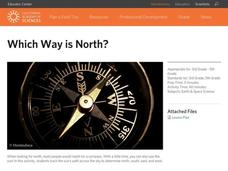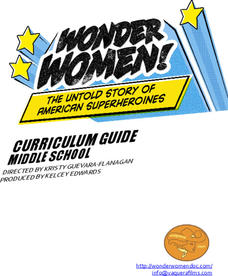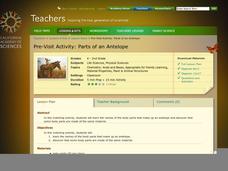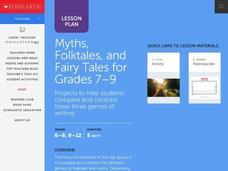Howard Hughes Medical Institute
Classroom Activities: Stem Cells and Diabetes
A multi-faceted lesson immerses AP biologists into the world of the stem cell. Using PowerPoint presentations, you introduce your class to diabetes and the possibility of finding cures through stem cell research. Online animations and...
Intensive Intervention
Fractions as Numbers
Your learners will enjoy thoroughly understanding fractions, and you will appreciate the abundant, quality resources in this comprehensive unit that builds toward a complete understanding of the concept of fractions as numbers. Many...
Howard Hughes Medical Institute
Electrical Activity of Neurons
How do neurons that don't touch each other share information? Observe electrical activity traveling from neurons and learn what it takes to trigger action potential. A video discusses recent research manipulating neurons, how responses...
Curated OER
Ecosystems
A critical look into the structure and function of ecosystems is here for young learners as a series of lessons and worksheet activities. Topics covered include land-based and marine ecosystems, connections to the water cycle, food...
Howard Hughes Medical Institute
Winogradsky Columns: Microbial Ecology in the Classroom
Winogradsky columns are ideal for observing the role of bacteria and other microorganisms in an ecosystem. This student activity guide is complete with data tables for observations and analysis questions for processing what was observed....
California Academy of Science
Which Way is North?
Who needs a compass to find cardinal directions? Just place a stick in the ground and record the movement of its shadow over the course of a day. Then, measure the shadow lengths in order to determine a north-south line. A simple...
Curated OER
Personal Health Series: Fitness
Complete activities to help your class appreciate the importance of physical activity. They will answer discussion questions, read articles, and create their own physically active game in order to deepen their knowledge and appreciation...
Dr. Seuss Enterprises
Dr. Seuss in the Classroom
Explore the works of Dr. Seuss, such as Horton Hears a Who, Horton Hatches and Egg, The Sneetches and Other Stories, The Lorax, The Butter Battle Book, and Yertle the Turtle and Other Stories. Each story lesson includes reading...
California Academy of Science
Kinesthetic Astronomy: Birthday Stars
Space explorers take a virtual trip around the sun right within your classroom! They stand in a circle facing away from the "sun" (a lamp) in the center of the room. As they move according to your instructions, they view different...
California Academy of Science
Kinesthetic Astronomy: Mars Opposition Dance
Your class will watch as one child orbits the sun as Earth, while another orbits as Mars. If the timing is right, they will see the repetitive dance between the two planets and discover how often they are opposite from each other. For...
Vaquera Films
Wonder Women - The Untold Story of American Superheroines: Middle School Curriculum Guide
Women in power are the focus of a three-module unit that employs comic books to bring home the importance of equality and proficient media literacy skills. In module one, scholars examine gender roles in media—boosting media literacy and...
Howard Hughes Medical Institute
The Making of the Fittest: The Birth and Death of Genes
After watching an engaging 13-minute video about the colorless blood of icefish, future ichthyologists examine icefish blood and non-icefish blood (blood samples are simulated with Karo syrup mixtures) to determine advantages of...
Howard Hughes Medical Institute
The Making of the Fittest: Natural Selection in Humans
Sickle cell disease only occurs when both parents contribute the trait, and mostly in those of African descent. Where did it come from? How did it evolve? Tony Allison, a molecular biologist, noticed a connection between sickle cell and...
Howard Hughes Medical Institute
The Making of the Fittest: Got Lactase? The Co-evolution of Genes and Culture
Got milk? Only two cultures have had it long enough to develop the tolerance of lactose as an adult. Learn how the responsible genes evolved along with the cultures that have been consuming milk. This rich film is supplied with a few...
Virginia Commonwealth University
General Construction Measurement and Dimensions
Learners construct their understanding of measurement and dimensions in this step-by-step approach that begins with an all group vocabulary introduction, consisting of measuring objects and dialoging using measurement vocabulary....
California Academy of Science
Parts of an Antelope
There are so many wonderful parts to an animal: fur, antlers, tails, and legs, to name a few. A large diagram of an antelope is used to start a matching game, where the class matches body parts made of the same material. They discuss...
Scholastic
Myths, Folktales, & Fairy Tales for Grades 7-9
Here is a must-have resource for studying fairy tales, myths, and folktales with your class! It includes instructional ideas, activities, and materials to support a month-long review of these three unique genres of writing.
California Academy of Science
Earthquakes and Tectonic Plates
Here is a comprehensive package in which middle schoolers learn about types of seismic waves, triangulation, and tectonic plate boundaries. Complete vocabulary, colorful maps, and a worksheet are included via links on the webpage. You...
Pie Council
National π Day
Learners can enjoy pi with pie! A collection of short activities celebrates pi day with a word search, a maze, and real-world problemsn. Using pi in formulas for area, circumference, and volume as well as exploring simple fractions is...
Personal Genetics Education Project
Reproductive Genetic Testing: Technology, Access, and Decision Making
Explore the complexities of reproductive genetic testing respectfully in the learning space. Scientists read articles, view a slideshow, and complete a do-now about genetic technologies. A fishbowl activity allows scholars to discuss the...
Special Olympics
Train at School
Here is a fantastic compilation of adaptive physical education lesson plans that cover the major concepts of physical fitness, including: aerobic endurance, balance, coordination, flexibility, power, speed and agility, and...
California Academy of Science
Tropical Belt
Where in the world is the equator? Explore a world map with your class, coloring in oceans, continents, and rainforests while locating the three major lines of latitude: the equator, Tropic of Cancer, and Tropic of Capricorn. Discuss how...
California Academy of Science
Be Prepared for an Earthquake
Earthquakes can be frightening and dangerous, but being prepared can make a world of difference. Perform an earthquake simulation during which the class practices how to drop, cover, and hold on as you read a script...
Scholastic
Study Jams! Earthquakes
Have a seismic moment with your class as you show this animated video on earthquakes. Viewers find that quakes occur on faults and are caused by shifting of continental plates. They learn what properties are studied by seismologists and...
Other popular searches
- Activities Word Draw Rise
- Christmas Activities
- Multiplication Activities
- Writing Activities
- Spanish Christmas Activities
- Activities for the Snowy Day
- Math Activities
- Summarizing Activities
- Sequencing Activities
- Social Studies Activities
- Fitness Activities
- Prewriting Activities





















